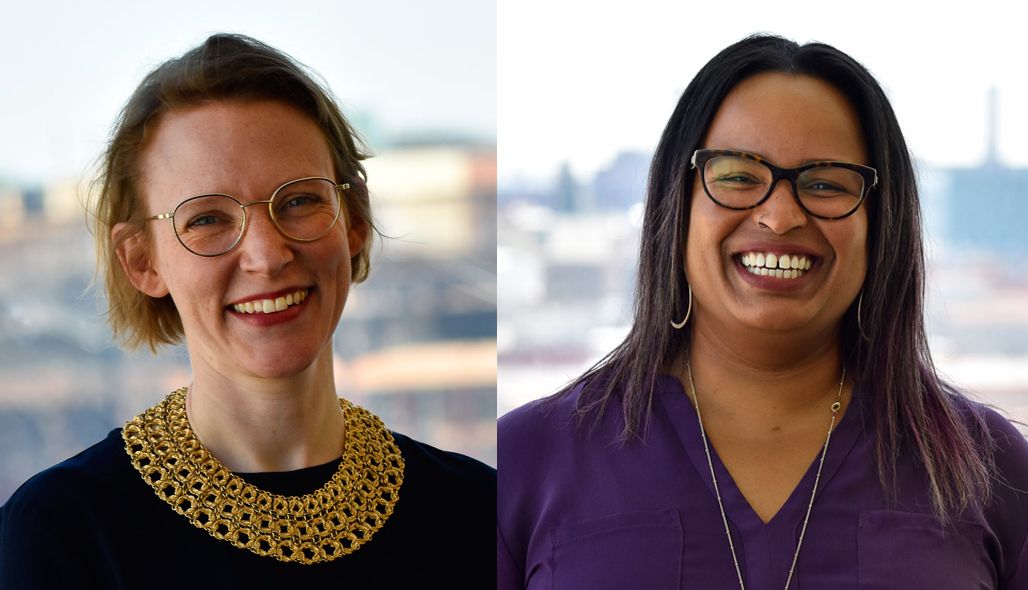
Assistant Professor Katharine Bloeser (left), Assistant Professor Maria Y. Rodriguez (right)
Silberman Scholarship Spotlight showcases the extraordinary faculty research and scholarship that distinguish the Silberman School of Social Work at Hunter College. The July 2019 Spotlight profiles Professor Katharine Bloeser’s innovative research with veterans and Professor Maria Rodriguez’ exciting work on the use of big data and computational methods in social work.
Katharine Bloeser Spotlights Veterans’ Experiences with V.A. Grant
Assistant Professor Katharine Bloeser’s groundbreaking project explores institutional betrayal among veterans who have been exposed to airborne hazards. The project expands this concept to understand veterans’ experiences of institutional courage, where institutions have acted in ways that prevented harm and promoted healing. Dr. Bloeser’s innovative research with her colleague Dr. Kelly McCarron is supported by the War-Related Illness and Injury Study Center’s Airborne Hazards and Burn Pit Center of Excellence, at the VA-New Jersey Health Care System in East Orange, New Jersey. Among the first and most comprehensive critical reviews of social work literature on veterans, Dr. Bloeser’s “A Scoping Review of Contemporary Social Work Practice with Veterans” will be published later this year in the high-impact journal Research on Social Work Practice; and, she has two forthcoming articles under review that bring much-needed attention to LGBTQ veterans’ experiences.
Dr. Bloeser’s research consistently seeks to understand the needs of veterans and, in particular, to bridge the disparities that marginalized veteran populations face when accessing health and mental health services. “Veterans are such an incredible, resilient group of people,” she expresses, “who are a lot like social workers in their desire to help, serve, and be part of something bigger than themselves.” That resilience motivates Dr. Bloeser’s approach to scholarship as a means for improving the lives of those she researches, along with all veterans.
Maria Rodriguez Launches, Expands Projects Joining Social Work and Big Data
Assistant Professor Maria Y. Rodriguez’s innovative work sets the standard for scholarship on the burgeoning intersections of computational social science (big data), community organizing, and social work practice – particularly how social media and social work affect one another. She recently collaborated with the University of Louisville’s Dr. Heather Storer on a major project to analyze 55,000 Tweets by domestic violence survivors using the hashtags #whyIstayed and #whyIleft. Dr. Rodriguez’s scholarship based on their findings will influence future research across many fields, including an article about mixed-method topic modeling that will be published in the Journal of Technology and Human Services and an article titled “Leaving Was a Process, Not an Event” that will appear in the Journal of Interpersonal Violence. Her parallel research on algorithmic decision-making in the human services will also be published this year in the Journal of Family Violence and is under review in other leading publications.
Dr. Rodriguez has spearheaded two key initiatives connecting the Silberman School of Social Work to national and international conversations in data-driven social science – and ensuring the School continues to play a leading role in those conversations. This summer with her planning, Silberman is hosting a satellite site of the Summer Institute in Computational Social Science (SICSS), an annual program supported by the Russell Sage Foundation and the Alfred P. Sloan Foundation. Silberman is the only SICSS site specific to social work students and researchers. Building from this momentum, Dr. Rodriguez and the Silberman School of Social Work are thrilled to launch a computational research methods laboratory called caretLAB later this year, the nation’s first incubator dedicated to computational social science methodology, theory, and applied research within a school of social work.




